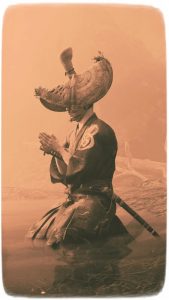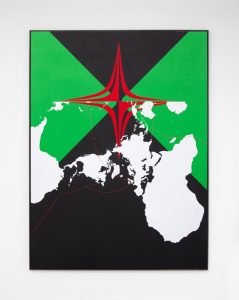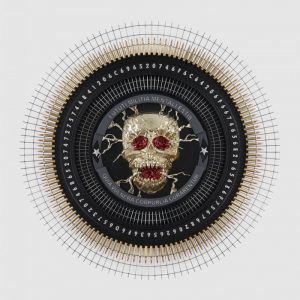Just spent 3 days in Rome to check out FotoGrafia, the 7th edition of international festival of photography which runs until May 25th in several venues throughout the city.
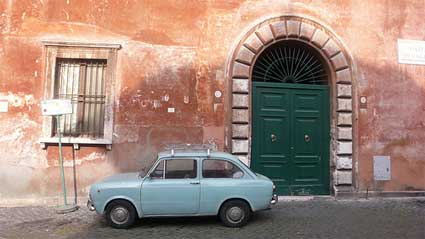
In a time when most photo festivals focus on urbanity, chaos or sustainability, the theme chosen by FotoGrafia this year is very brave: “Seeing normality. Photography portrays daily life”.
First stop was the Palazzo delle Esposizioni there were several shows by young photographers but one of the photo series was so striking (and so far away from what you and i would regard as “normality”), i spent the rest of my stay in the Italian capital obsessing about it. Chinese Wild West, a collaboration between photographer Paolo Woods and journalist Serge Michel, follows China’s industrial neo-colonialism in African lands.
As they explain: To quench its thirst for oil, its hunger for copper, uranium and wood, Beijing has sent out its state companies and its adventurous entrepreneurs to conquer Africa.
For the 500.000 Chinese who have emigrated to the ‘dark continent’ there is the promise of a 21st century Wild West. Some have struck gold and run large conglomerates that span whole regions of Africa, others are still selling their cheap goods on the burning hot roadsides of the poorest countries in the world.
For the Africans, the arrival of the Chinese is perhaps the most important event of the forty years of independence. The Chinese do not look like the former colonialists. They build roads, dams and hospitals and win over the people. They speak neither of democracy nor transparency and they win over the dictators.
Woods and Michel conclude their presentation of the work with these words: These are rare images: Beijing wants to keep a low profile for its conquest. But though it remains largely unexposed these photographs portray a phenomenon, a new dimension of globalization, that threatens to leave the West behind.
The amazing photos are accompanied by a short explanatory text. A selection:
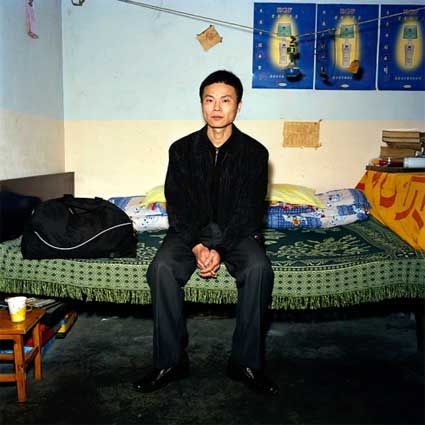 China, Mianyang, 2007
China, Mianyang, 2007
Peng Shu Lin is leaving tonight to go and work in Nigeria. He is 36. He has spent more then half of his life melting plastic in a state factory in Mianyang, his hometown in the center of China. His 90$ monthly salary is simply not enough anymore to live on and help his ageing parents. In Nigeria he will work in one of the 40 factories of a Honk Kong businessman, for a 550$ salary plus room and board. Peng Shu Lin has never left his Sichuan province, never taken a plane and never seen a black man, except on television. All he is taking to Africa is in the small sport bag next to him. He thinks that when he returns to China, in two or three years, he will have saved something like 15.000$, enough to get married and open an Internet café in his town.
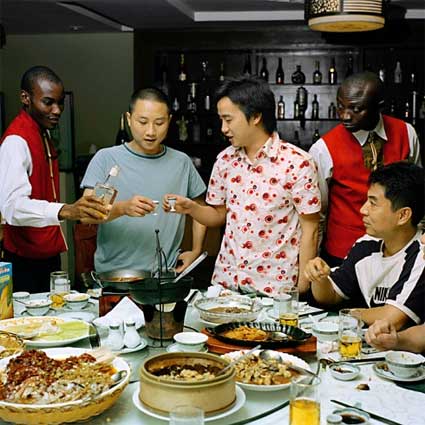 Nigeria, Lagos, 2007
Nigeria, Lagos, 2007
A festive dinner for the meeting of the association of Chinese entrepreneurs of Lagos that takes place monthly at the restaurant “Mr. Chang”. The responsible of the association are the new generation of Chinese businessman in Africa. They are often very young and their companies are booming. The waiters are dressed in Chinese costumes directly imported.
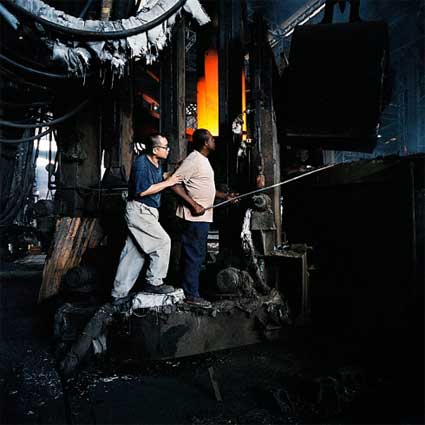 Nigeria, Lagos, 2007
Nigeria, Lagos, 2007
Nigerian workers and a Chinese technician organize the production at Federated Steel. The Chinese expats, who are often very qualified, are charged with forming the Nigerians as well as keeping up the very intense work rhythm. Even if the Chinese often speak little more then a few works of English they occasionally manage to create a complicity with their African colleagues.
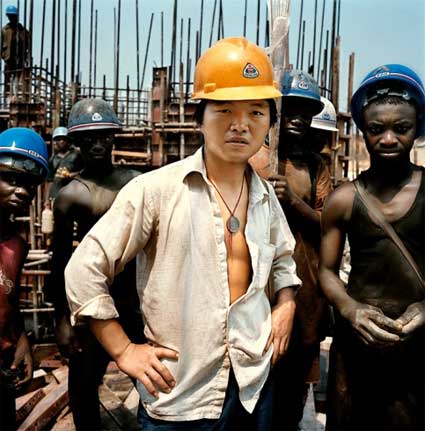 Congo, Imboulou dam, 2007
Congo, Imboulou dam, 2007
On the building site of the Imboulou dam, Republic of the Congo, 200km north of the capital Brazzaville. In the foreground a Chinese worker of the China National Mechanical & Equipment corporation (CMEC) company, which in 2001 has obtained the contract. With its 120 megawatts, this power plant will double the national production of electricity and will give light to a large part of Congo. 400 Chinese technicians and qualified workers supervise a Congolese workforce of a thousand man, paid 3 dollars a day, that disappear as fast as they can find a better paid job. This, in part, explains the dam’s construction delay that has to be absolutely terminated by 2009, the year of the next Congo elections. CMEC requires the Chinese workers to wear yellow and the Congolese blue hardhats.
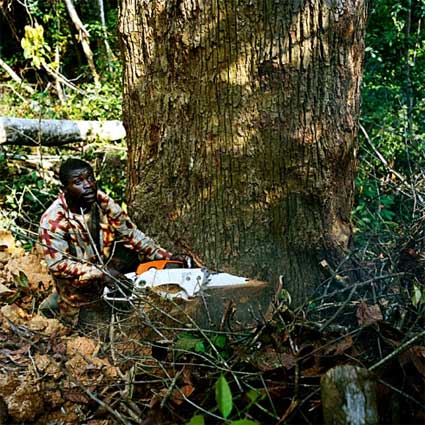 Congo, Conkouati National Park, 2007
Congo, Conkouati National Park, 2007
In the Cotovindou logging concession a Congolese worker for the Chinese timber company Sicofor saws down a 22-meter moabi tree that will be loaded the same day on a truck bound for Pointe Noire. From there it will be embarked for China. It will probably end up as luxury furniture in Europe or the States. Moabi (baillonella toxisperma) takes about hundred years to reach maturity. Its fruits are edible, its bark has medical applications and the oil its seeds produce is very sought after on the African markets. The droppings of elephants, that love the Moabi fruits, are the main mechanisms for spreading the seeds and therefore of its reproduction. Due to poaching, elephants are getting rare, due to logging Moabi is getting rare. In the Congo forest elephants and Moabi could disappear at the same time. Moabi has been included in the red list of IUCN (International Union for Conservation of Nature and Natural Resources) in 2004.
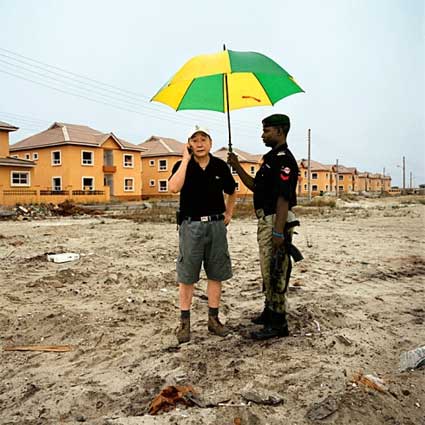 Nigeria, Lagos, 2007
Nigeria, Lagos, 2007
Mr. Wood was born in Shanghai in 1948 and arrived in Nigeria at the end of the 70’s were he started an industrial empire that includes today about 15 factories with more then 1600 workers, construction companies, hotels and restaurants. He is an official adviser to the president and has obtained the title of African chief and the authorization to use police cars as his own which helps in the monstrous Lagos traffic jams. He uses as well the police as private bodyguards, like here on the construction site of 544 villas built at record speed on the Lekki peninsula near the headquarters of the Chevron oil company.
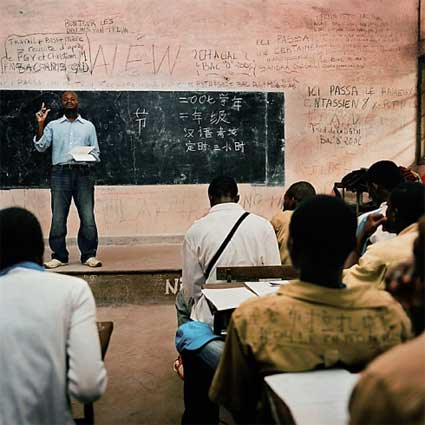 Congo, Brazzaville, 2007.
Congo, Brazzaville, 2007.
The Savorgnan de Brazza high school is the most respected school in the Congolese capital but is in very bad need of repair. Jean de Dieu Malanga, professor of Chinese, is giving the students of the second year their annual examination. He himself has studied in China during the 80’s and makes a living as a translator for the Chinese bosses at the numerous construction sites besides his work as a teacher.
The full photo series is on view on Paolo Woods ‘s website.

